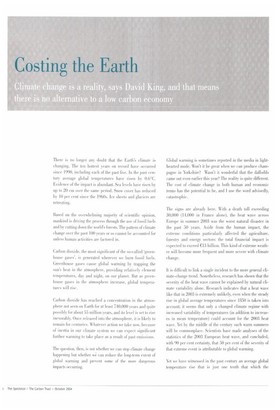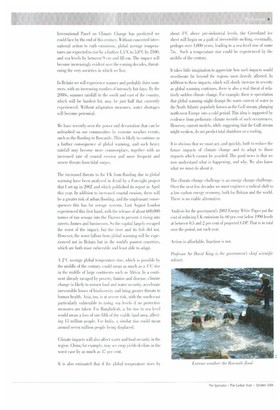Costing the Earth
There is no longer any doubt that the Earth's climate is changing. The ten hottest years on record have occurred since l990, including each of the past five, in the past century average global temperatures have risen by 0.6°C. Evidence of the impact is abundant. Sea levels have risen by up to 20 cm over the same period. Snow cover has reduced by 10 per cent since the 1960s. Ice sheets and glaciers are retreating.
Based on the overwhelming majority of scientific opinion, mankind is driving the process through the use of fossil fuels and by cutting down the world's forests. The pattern of climate change over the past 100 years or so cannot be accounted for unless human activities are factored in.
Carbon dioxide, the most significant of the so-called 'greenhouse gases', is generated wherever we burn fossil fuels. Greenhouse gases cause global warming by trapping the sun's heat in the atmosphere. providing relatively clement temperatures, day and night, on our planet. But as greenhouse gases in the atmosphere increase, global temperatures will risc.
Carbon dioxide has reached a concentration in the atmosphere not seen on Earth for at least 740,000 years and quite possibly for about 55 million years, and its level is set to rise inexorably. Once released into the atmosphere, it is likely to remain for centuries. Whatever action we take now, because of inertia in our climate system we can expect significant further warming to take place as a result of past emissions.
The question, then, is not whether we can stop climate change happening but whether we can reduce the long-term extent of global warming and prevent some of the more dangerous impacts occurring. Global warming is sometimes reported in the media in lighthearted mode. Won't it he great when we can produce champagne in Yitrkshire? Wasn't it wonderful that the daffodils came out even earlier this year'? The reality is quite different. The cost of climate change in both human and economic terms has the potential to be. and I use the word advisedly, catastrophic.
The signs are already here. With a death toll exceeding 30,000 (14.000 in France alone), the heat wave across Europe in summer 200.3 was the worst natural disaster in the past 50 years. Aside from the human impact, the extreme conditions particularly affected the agriculture, forestry and energy sectors: the total financial impact is expected to exceed €13 billion. This kind of extreme weather will become more frequent and more severe with climate change.
it is difficult to link a single incident to the more general climate-change trend. Nonetheless, research has shown that the severity of the heat wave cannot be explained by natural climate variability alone. Research indicates that a heat wave like that in 2003 is extremely unlikely, even when the steady rise in global average temperatures since 1850 is taken into account; it seems that only a changed climate regime with increased variability of temperatures (in addition to increases in mean temperature) could account for the 2003 heat wave. Yet by the middle of the century such warm summers will be commonplace. Scientists have made analyses of the statistics of the 2003 European heat wave, and concluded, with 90 per cent certainty, that 50 per cent of the severity of that extreme event is attributable to global warming.
Yet we have witnessed in the past century an average global temperature rise that is just one tenth that which the International Panel on Climate Change has predicted we could face by the end of this century. Without concerted international action to curb emissions, global average temperatures are expected to rise by a further 1.5°C to 5.8°C by 2100, and sea levels by between 9 cm and 88 cm. The impact will become increasingly evident over the corning decades, threatening the very societies in which we live.
In Britain we will experience warmer and probably drier summers, with an increasing number of intensely hot days. By the 2080s, summer rainfall in the south and east of the country. which will be hardest hit. may be just half that currently experienced. Without adaptation measures, water shortages will become perennial.
We have recently seen the power and devastation that can be unleashed on our communities by extreme weather events. such as the flooding in Boscastle. This is likely to continue as a further consequence of global warming, and such heavy rainfall may become more commonplace. together with an increased rate of coastal erosion and more frequent and severe threats from tidal surges.
The increased threats to the UK from flooding clue to global warming have been analysed in detail by a Foresight project that I set up in 2002 and which published its report in April this year. In addition to increased coastal erosion, there will be a greater risk of urban flooding, and the unpleasant consequences this has for sewage systems. Last August London experienced this first hand, with the release of about 600,000 tonnes of raw sewage into the Thames to prevent it rising into streets, homes and businesses. SO the capital largely escaped the worst of the impact, but the river and its fish did not. However, the worst fallout from global warming will be experienced not in Britain but in the world's poorest countries, which are both most vulnerable and least able to adapt.
A 2°C average global temperature rise, which is possible by the middle of the century. could mean as much as a 4°C rise in the middle of large continents such as Africa. In a continent already ravaged by poverty, famine and disease, climate change is likely to worsen food and water security, accelerate irreversible losses of biodiversity and bring greater threats to human health. Asia, too, is at SPVITC risk, with the south-east particularly vulnerable to rising sea levels if no protective measures are taken. For Bangladesh. a lm rise in sea level would mean a loss of one fifth of the viable land area, affecting 15 million people. For India, a similar rise could mean around seven million people being displaced.
Climate impacts will also affect water and food security in the region. China, for example, now see crop yields decline in the worst case by as much as 37 per cent.
It is also estimated that if the global temperature rises by about 3°C above pre-industrial levels, the Greenland ice sheet will begin on a path of in-eversible melting, eventually, perhaps over 1,0(K) years, leading to a sea-level rise of some 7m. Such a temperature rise could be experienced by the middle of the century.
It takes little imagination to appreciate how such impacts would reverberate far beyond the regions most directly affected. In addition to these impacts, which will slowly increase in severity as global warming continues, there is also a real threat of relatively sudden climate change. For example. there is speculation that global warming might disrupt the warm current of water in the North Atlantic popularly known as the Gulf stream, plunging north-west Europe into a cold period. This idea is supported by evidence from prehistoric climate records of such occurrences. However, current models, while suggesting that the Gulf stream might weaken, do not predict total shutdown or a cooling.
It is obvious that we must act, and quickly, both to reduce the future impacts of climate change and to adapt to those impacts which cannot be avoided. The good news is that we now understand what is happening, and why. We also know what we must do about it.
The climate change challenge is an energy change challenge. Over the next few decades we must engineer a radical shift to a low carbon energy economy, both for Britain and the world. There is no viable alternative.
Analysis for the government's 2003 Energy White Paper put the cost of reducing UK emissions by 60 per cent below 1990 levels at between 0.5 and 2 per cent of projected GDR That is in total over the period, not each year.
Action is affordable. Inaction is not.
Professor Sir David King is the gmernment's chief scientific adviser.



















































































































 Previous page
Previous page